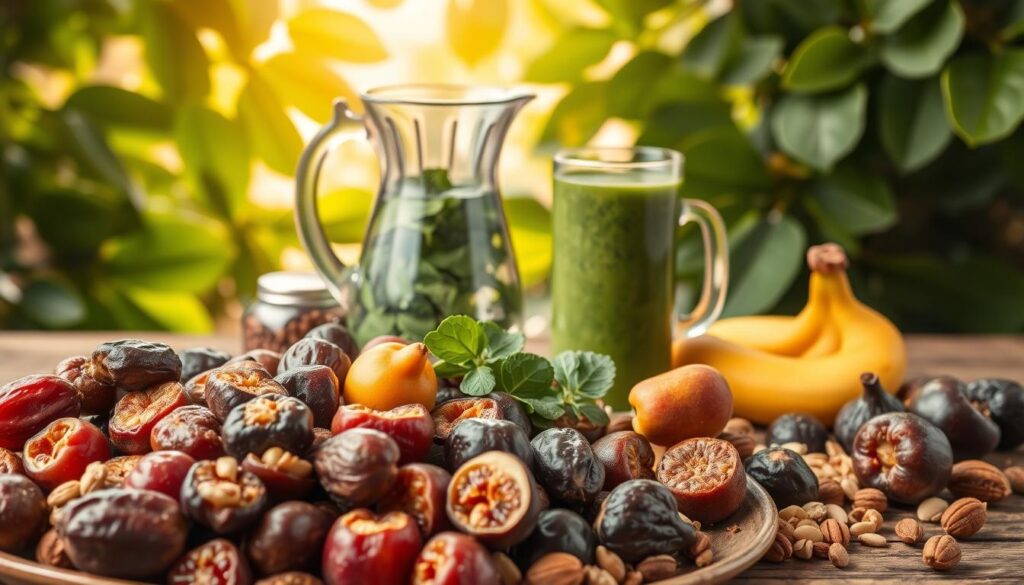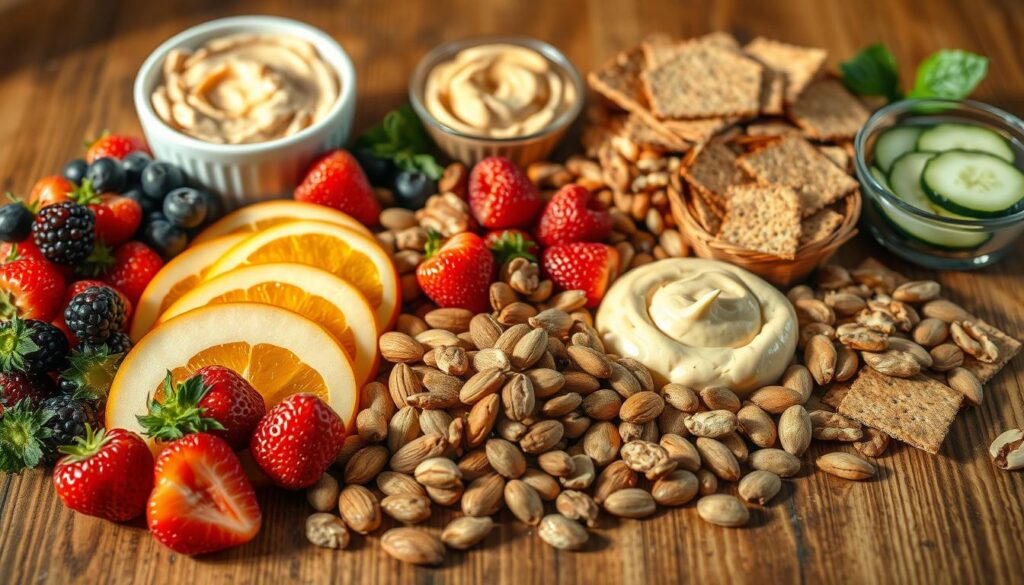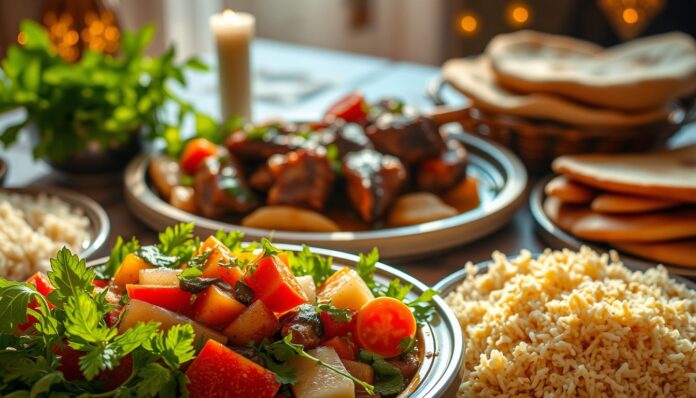Over 1.8 billion Muslims worldwide observe Ramadan. Yet, nearly 60% struggle to keep a balanced ramadan diet during fasting. This month is for spiritual reflection, but it’s also crucial to eat right to stay energized and healthy. and this can be possible with Healthy Ramadan Recipes.
At Tasty Trove, we think nourishment and faith can go hand in hand. Our guide mixes science-backed nutrition with timeless traditions. It helps you make meals that honor your body and culture.
Key Takeaways
- Maintain energy through a balanced ramadan diet focused on slow-digesting carbs and lean proteins.
- Traditional dishes like dates and lentils can be enhanced with modern nutrition tips without losing cultural significance.
- Avoid overeating during iftar by prioritizing hydration and portion control.
- Plan ahead with our strategies to simplify meal prep and reduce stress.
- Discover how small adjustments to suhoor and iftar improve stamina and well-being.
Understanding Healthy Food During Ramadan: Nutrition Basics
Proper ramadan nutrition keeps your body energized during fasting. Balanced meals help you stay alert and prevent tiredness. They also support your overall health. Let’s dive into the key points.
Why Nutrition Matters When Fasting
When fasting, your body uses stored energy. Eating healthy meals at sehir and iftar helps. They refill nutrients and keep blood sugar stable. Without them, you might feel weak or get dehydrated.
Key Nutrients to Focus On
Here are the nutrients you should focus on for better health:
| Nutrient | Importance | Sources |
|---|---|---|
| Complex Carbohydrates | Maintain energy levels | Oatmeal, whole-grain bread, lentils |
| Proteins | Support muscle repair | Chicken, beans, Greek yogurt |
| Healthy Fats | Slow digestion, curb hunger | Avocados, nuts, olive oil |
Common Nutritional Mistakes to Avoid
- Eating too much sugar during iftar
- Skipping water between fasts
- Overloading on fried or processed foods
- Ignoring fiber-rich foods
By avoiding these mistakes, you can enjoy a better fasting experience. Focus on whole foods and drinking plenty of water. This will help you have a balanced ramadan nutrition plan.
Planning Your Ramadan Meal Strategy
Effective halal meal planning helps your body get the nutrients it needs without stressing you out. Start by planning meals for the week. Choose traditional dishes but also think about nutritional balance. Making a weekly template can make choosing meals easier on busy days.
“Planning minimizes last-minute decisions that often lead to unhealthy choices during fasting months.” – American Dietetic Association
Start with a detailed grocery list, sorted by food type like grains, proteins, and veggies. Choose foods that give you energy slowly, like oats and legumes. Here’s how to mix tradition with health:
- Add halal-certified proteins like chicken or lentils to iftar spreads
- Drink dates and water for a gentle energy boost
- Make big batches of soups or stews for quick reheats
| Meal Time | Nutrient Focus | Halal-Friendly Options |
|---|---|---|
| Suhoor | Fiber & Protein | Whole-grain porridge with nuts |
| Iftar | Electrolytes | Cucumber-mint water, labneh with pomegranate |
| Midnight Snack | Complex Carbs | Whole-wheat khubz with hummus |
Divide your plate into thirds: 1/3 protein, 1/3 grains, and 1/3 veggies. Use halal-certified meal kits from Islamic FoodHub for easy portions. Start with small portions to avoid stomach upset. With smart halal meal planning, you can keep traditions alive while staying healthy.
Suhoor: Power-Packed Pre-Dawn Meals
Starting your fasting day right is key. Choose suhoor meal ideas that fuel you for hours. Focus on foods that digest slowly to keep your energy up until iftar. Here’s how to build meals that nourish without weighing you down.
Slow-Release Energy Foods for Lasting Satiety
Go for foods high in fiber, protein, and healthy fats. Oats, quinoa, and whole-grain bread digest slowly. Eggs, Greek yogurt, and nuts help keep blood sugar stable. Add veggies like spinach or tomatoes for extra nutrients.
Quick and Easy Suhoor Recipes
- Oatmeal Power Bowl: Mix oats with almond milk, chia seeds, and a banana. Top with walnuts and a drizzle of honey.
- Egg & Veggie Toast: Toast whole-grain bread, layer with avocado, scrambled eggs, and a sprinkle of chili flakes.
- Smoothie Boost: Blend spinach, frozen berries, Greek yogurt, and protein powder for a portable option.
Make-Ahead Suhoor Options
| Meal | Prep Method | Storage |
|---|---|---|
| Overnight Oats | Mix oats, milk, and toppings in jars. | Refrigerate up to 3 days. |
| Egg Muffins | Whisk eggs with veggies, bake, and portion into containers. | Freeze individually for 1 month. |
| Whole-Grain Burritos | Layer beans, spinach, and cheese in tortillas; wrap tightly. | Freeze flat for easy reheating. |
With these suhoor meal ideas, you can save time and ensure every bite counts. Aim for balance—mix textures, flavors, and nutrients without overcomplicating. Small portions of nutrient-dense foods go a long way.
Iftar: Balanced Meals to Break Your Fast
Start iftar with dates and water to follow tradition and rehydrate. Our iftar meal recipes aim for balance. We pair proteins like grilled chicken or lentils with whole grain bread or quinoa. Vegetables like roasted zucchini or spinach-stuffed grape leaves are key.
- Protein-packed options: Try baked salmon with turmeric or chickpea curry for vegetarian-friendly protein.
- Vegetable-forward dishes: Zucchini fritters or carrot-kale salads add vitamins without excess calories.
- Smart sweets: Dates stuffed with almond butter or yogurt-based shrikhand satisfy cravings healthfully.
Eating mindfully helps avoid overeating. Serve dishes family-style but encourage small portions. Use smaller plates to control intake. Our iftar meal recipes include swaps like Greek yogurt in desserts or farro instead of white rice. Every bite should nourish your body for prayer and reflection.
“Breaking fast with dates is more than tradition—it’s a science. Their natural sugars stabilize blood glucose levels gently.”
Discover global flavors without losing health: try Egyptian molokhia with lean lamb or Moroccan spiced lentil soup. Each dish in our collection balances taste and nutrition. This way, you can enjoy Ramadan’s culinary delights while staying healthy.
Hydration Strategies: Beyond Water
Hydration during fasting is more than just drinking water. Our bodies need a balanced approach to stay nourished and energized. Foods and drinks with high water content, along with strategic timing, play a key role in maintaining wellness. Let’s explore how to optimize every sip and bite.
Hydrating Foods to Include
Nature’s water-rich foods can boost hydration during fasting. Prioritize:
- Cucumber (96% water) in salads or chilled slices
- Watermelon cubes as a post-iftar treat
- Leafy greens like spinach in soups or salads
- Oranges or grapefruit segments for vitamin C and fluids
Beneficial Drinks and Smoothies
Pair water with these options to support hydration during fasting:
- Coconut water for natural electrolytes
- Infused water with mint and cucumber
- Aloe vera juice diluted with water
- Green smoothies blending spinach, banana, and yogurt
Avoid sugary juices and caffeine-heavy drinks that increase thirst.
Timing Your Fluid Intake
Spread hydration evenly to prevent dehydration:
- Drink 1-2 glasses of water immediately after iftar.
- Sip fluids steadily between meals, avoiding large gulps close to fasting hours.
- Have a small glass of water 15 minutes before bedtime.
Watch for signs like dry mouth or fatigue—these signal your body needs more fluids.
Energy-Boosting Foods That Sustain Through Fasting
Choosing the right foods is key to staying energized during Ramadan. Foods high in complex carbs, protein, and healthy fats help keep you focused and active. They help keep your energy levels steady and prevent feeling tired in the middle of the day.

Complex Carbohydrates to Include
Complex carbs give you energy by releasing glucose slowly. Here are some good options:
- Brown rice or quinoa in main dishes
- Whole grain bread or barley for suhoor
- Sweet potatoes or oats in breakfast options
These foods digest slowly, keeping your blood sugar stable.
Protein Sources for Sustained Energy
Protein helps you feel full and keeps your muscles strong. Try these:
- Lean meats like turkey or grilled fish
- Plant-based options such as lentils, chickpeas, or tofu
- eggs or Greek yogurt for quick protein boosts
Have 2-3 protein servings a day to meet your increased needs during fasting.
Healthy Fats and Their Role
Healthy fats slow digestion and help you absorb nutrients better. Include these in your diet:
- Avocados in salads or dips
- Nuts like almonds or walnuts as snacks
- Olive oil for cooking or dressings
These fats support brain function and reduce cravings. Aim for a mix of omega-3s and monounsaturated fats for better energy release.
Traditional Ramadan Dishes with a Healthy Twist
Rediscover your favorite Ramadan recipes with a focus on healthy food during Ramadan. Many dishes can keep their cultural flavor with simple tweaks. Baking or air-frying is a better choice than deep-frying. Using natural ingredients like dates or Greek yogurt boosts nutrition without losing taste.
- Baked Samosas: Choose whole-wheat dough baked until crispy instead of deep-frying. Pair it with cucumber raita for extra hydration.
- Lighter Curries: Cut oil by 40% and add more veggies like spinach and cauliflower. Use lean chicken or chickpeas for protein.
- Date-Sweetened Desserts: Replace sugar in kunafa or halwa with Medjool dates. This reduces added sugars by 60% while keeping tradition.
Comparing old and new recipes shows big improvements. Baked samosas save 300 calories per piece. Roasted vegetable biryani uses quinoa instead of rice, adding fiber and protein.
“My family loves these changes! We still enjoy our favorites but feel lighter after meals.” – Chicago-based Ramadan fasters
Small changes make a big difference. Swapping coconut oil for olive oil in baklava or using mashed bananas in ma’amoul cookies adds moisture without saturated fats. These tweaks keep cultural joy and wellness goals in balance.
Smart Snacking Between Iftar and Suhoor
Between sunset and dawn, it’s key to snack wisely. Choose foods like yogurt with fruit or nuts. They give you energy without messing with your sleep.

Eating lightly before bed helps avoid sleep issues, experts say. Pick snacks that digest easily for better sleep.
Here’s how to pick the best snacks for late nights:
Nutritious Late-Night Options
- Greek yogurt + ½ cup berries (protein + antioxidants)
- 6 whole-grain crackers with 2 tbsp hummus
- 1 oz almonds (16-20 nuts) with ¼ cup dried apricots
| Nutritious Options | Benefits | Serving Size |
|---|---|---|
| Greek yogurt + berries | Protein + fiber for sustained energy | ½ cup |
| Whole-grain crackers + hummus | Complex carbs + plant-based protein | 6 crackers + 2 tbsp |
| Almonds + dried fruit | Healthy fats + slow-digesting carbs | 1 oz + ¼ cup |
Portion Control Tips
- Pre-portion snacks into small containers or bags
- Use salad plates instead of dinnerware for evening nibbles
- Pause 15 minutes after eating small snacks to assess true hunger cues
Eat your last snack at least 2 hours before bed. This helps with digestion. Small, balanced snacks keep your energy up and let your body rest.
Meal Prep Guide for a Stress-Free Ramadan
Effective halal meal planning can change your Ramadan for the better. Spend some time planning ahead to avoid kitchen chaos. This way, you can focus more on the spiritual side of Ramadan. Here are some tips to make your cooking easier.
Weekly Planning Templates
Begin with our customizable weekly templates. These help organize your meals for each day, including suhoor, iftar, and snacks. You can download these forms to keep track of what you need and how much. They also come in different diets like low-carb or gluten-free, so you can find what works for you.
Freezer-Friendly Recipe Ideas
Try batch-cooking and freezing items like lentil soups, marinated chicken, or chopped veggies. Here are some great ideas with tips on how to store them:
| Recipe | Prep Time | Storage Method |
|---|---|---|
| Lamb stew | 1 hour | Freeze in airtight containers for up to 3 months |
| Vegetable biryani | 45 mins | Portion into single servings and freeze flat |
| Smoothie packs | 30 mins | Layer fruits and greens in freezer bags for quick morning prep |
Time-Saving Kitchen Hacks
- Batch-cook grains like quinoa or brown rice and freeze in 1-cup portions
- Use a slow cooker for overnight dishes like dal or soups
- Prep spice blends in advance to cut down on mealtime steps
By using these tips, you can reduce stress during Ramadan. Focus on planning your meals to ensure they are halal and fit your dietary needs.
Special Dietary Needs: Adapting for Health Conditions
If you have health concerns, adjusting your balanced Ramadan diet is key. Always talk to your healthcare provider before Ramadan to make a safe plan. Here’s how to make meals fit your health goals:
“Fasting with chronic conditions requires careful planning to avoid risks,” says Dr. Amina Khan, a certified nutritionist. “Work with your doctor to adjust medications and meal timing.”
- Diabetes: Eat foods with low glycemic index like oats and lentils. Keep an eye on blood sugar and adjust insulin as needed.
- Cardiovascular Health: Use herbs instead of salt to cut down on sodium. Choose omega-3 rich fish and whole grains.
- Digestive Issues: Opt for easy-to-digest foods like steamed veggies and lean proteins. Stay away from heavy spices or fatty foods.
- Anemia: Pair iron sources (spinach, lentils) with vitamin C-rich foods (oranges) to improve absorption.
If fasting is risky, talk to your doctor about other options. Doing good deeds or praying can help you stay committed while keeping your health safe. Remember, everyone is different. Get professional advice to make Ramadan nourishing and fulfilling for you.
Conclusion: Embracing Nourishment and Spirituality This Ramadan
Ramadan is not just about food; it’s about balancing our bodies and souls. Choosing foods like oats for suhoor or hydrating soups for iftar helps us stay healthy and focused. It’s a time to think about how our food affects our prayers and helping others.
Begin with small changes, like swapping sugary snacks for a dates-and-yogurt parfait. These small steps can lead to lasting habits. Share your favorite healthy recipes in the comments. Your ideas can help others nourish their bodies and deepen their faith.
Every mindful bite is a way to honor the gift of food. Let Ramadan teach us to appreciate our meals and think of those who don’t have enough to eat. When planning meals, consider donating to local food drives. Combining healthy eating with kindness makes Ramadan even more meaningful. May this season help you connect with your body and community in a healthier way.











